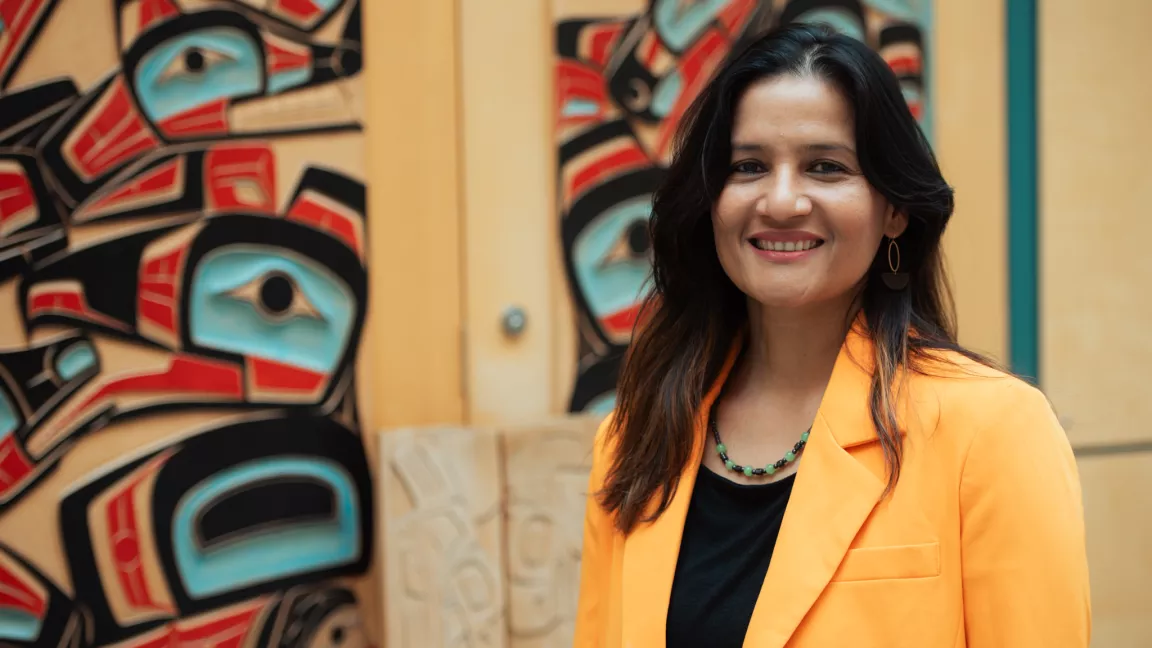Developing a women's cyber self-defence toolkit
Global and International Studies Assistant Professor Dr. Luna K C has been awarded a $50,000 Mobilizing Insights in Defence and Security (MINDS) Grant for an innovative research initiative aimed at combatting online gender-based violence.

Prince George, B.C. – When a woman or girl experiences online gender-based violence, UNBC researcher Dr. Luna K C says all too often, the proposed solution is to have them delete their social media accounts or limit their online presence.
“However, this approach risks depriving increasing numbers of women and girls of their digital rights,” says the Assistant Professor in UNBC’s Department of Global and International Studies. “Understanding cyberspace through a gendered and intersectional lens is crucial. The gendered nature of the online realm means the underlying harms are also gendered, disproportionately affecting racialized women and girls.”
The recipient of a $50,000 Mobilizing Insights in Defence and Security (MINDS) Grant from the Department of National Defence (DND), Dr. K C has embarked on an innovative research project to develop a Women’s Cyber Self-Defence Toolkit.
“My project aims to develop a toolkit to empower women and girls to combat online violence by enhancing their ability to navigate online platforms – uplifting their ability to engage on social media securely and confidently, rather than detaching from it,” she explains.
Her research project is focused on creating real-world, practical outcomes using a feminist approach. Its core study group consists of women veterans from the Canadian Armed Forces (CAF) and women cyber experts. And Dr. K C will bring together a diverse group of participants to collaborate on the project during a hybrid workshop hosted at UNBC’s Prince George campus on Nov. 21, 2024. The event will include students, faculty, women cyber experts and representatives from women’s organizations.
“Together, we will generate a toolkit, a policy brief and a podcast – all designed to be shared widely to raise awareness and provide practical tools to combatting online gender-based violence,” she says. “Moving forward, my goal is to build on this initial project to bring it to other audiences and eventually share it globally. The Women’s Cyber Self-Defence Toolkit and podcast can be used by all women and girls around the world.”
Dr. K C’s research addresses a global issue that has real-world consequences, as recognized by feminists, women’s organizations and international bodies such as the North Atlantic Treaty Organization through its updated policy on Women, Peace and Security (WPS). Sexual and gender-based violence, including online violence, is also a key focus area in Canada’s Third National Action Plan on WPS and is recognized as a significant issue for Indigenous women, girls and two-spirited individuals.
Supported by the MINDS grant, this research promises to contribute significantly to the global conversation on cyber safety, offering feminist solutions to online violence that resonate on both local and international levels. This project also aims to inform the CAF/DND on women’s cyber self-defence strategies, including enhancing military women’s security.
“My work has always focused on gender, peace and security and this project is a natural extension,” says Dr. K C. “Every woman and girl deserves the right to navigate the digital world without fear – empowered to express themselves freely and safely – as they claim their rightful place in the online world.”